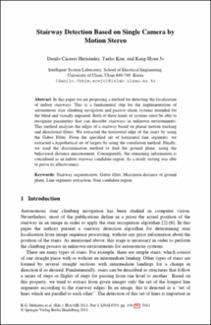El sistema se apagará debido a tareas habituales de mantenimiento. Por favor, guarde su trabajo y desconéctese.
Mostrar el registro sencillo del ítem
Stairway Detection Based on Single Camera by Motion Stereo
| dc.contributor.author | Cáceres Hernández, Danilo | |
| dc.date.accessioned | 2018-06-27T21:11:14Z | |
| dc.date.accessioned | 2018-06-27T21:11:14Z | |
| dc.date.available | 2018-06-27T21:11:14Z | |
| dc.date.available | 2018-06-27T21:11:14Z | |
| dc.date.issued | 2011-06-28 | |
| dc.date.issued | 2011-06-28 | |
| dc.identifier.uri | http://ridda2.utp.ac.pa/handle/123456789/5083 | |
| dc.identifier.uri | http://ridda2.utp.ac.pa/handle/123456789/5083 | |
| dc.description | In this paper we are proposing a method for detecting the localization of indoor stairways. This is a fundamental step for the implementation of autonomous stair climbing navigation and passive alarm systems intended for the blind and visually impaired. Both of these kinds of systems must be able to recognize parameters that can describe stairways in unknown environments. This method analyzes the edges of a stairway based on planar motion tracking and directional filters. We extracted the horizontal edge of the stairs by using the Gabor Filter. From the specified set of horizontal line segments, we extracted a hypothetical set of targets by using the correlation method. Finally, we used the discrimination method to find the ground plane, using the behavioral distance measurement. Consequently, the remaining information is considered as an indoor stairway candidate region. As a result, testing was able to prove its effectiveness. | en_US |
| dc.description.abstract | In this paper we are proposing a method for detecting the localization of indoor stairways. This is a fundamental step for the implementation of autonomous stair climbing navigation and passive alarm systems intended for the blind and visually impaired. Both of these kinds of systems must be able to recognize parameters that can describe stairways in unknown environments. This method analyzes the edges of a stairway based on planar motion tracking and directional filters. We extracted the horizontal edge of the stairs by using the Gabor Filter. From the specified set of horizontal line segments, we extracted a hypothetical set of targets by using the correlation method. Finally, we used the discrimination method to find the ground plane, using the behavioral distance measurement. Consequently, the remaining information is considered as an indoor stairway candidate region. As a result, testing was able to prove its effectiveness. | en_US |
| dc.language | eng | |
| dc.language.iso | eng | en_US |
| dc.rights | https://creativecommons.org/licenses/by-nc-sa/4.0/ | |
| dc.rights | info:eu-repo/semantics/openAccess | |
| dc.subject | Stairway segmentation | en_US |
| dc.subject | Gabor filter | en_US |
| dc.subject | Maximum distance of ground plane | en_US |
| dc.subject | Line segments extraction | en_US |
| dc.subject | Stair candidate region | en_US |
| dc.subject | Stairway segmentation | |
| dc.subject | Gabor filter | |
| dc.subject | Maximum distance of ground plane | |
| dc.subject | Line segments extraction | |
| dc.subject | Stair candidate region | |
| dc.title | Stairway Detection Based on Single Camera by Motion Stereo | en_US |
| dc.type | info:eu-repo/semantics/article | |
| dc.type | info:eu-repo/semantics/publishedVersion |
